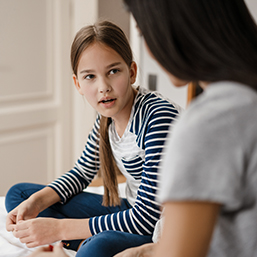
In my coaching work with parents, I hear this question regularly! Sneaky parents find out that their kids are being sneaky too, and, in a sense, both are caught off guard.
\nAs gross as this feels, this is one of those crazy times when, as parents, we must remind ourselves that we are adults. It is our job to be watching our kids and helping them learn from their mistakes. In this scenario, we get to learn from our mistakes as well.
\n \nHow do I confront my child?
\nWhen it comes to conflict communication, ambushes are rarely successful.
\nInstead, let your child know that you need to have a serious discussion with them and suggest two possible times. If neither time works, ask for a suggestion from them and, if possible, take it. Letting them choose the time gives them a bit of power when they feel like they have very little.
\nAs nervous as you are about the upcoming conversation, they are more nervous. It’s okay to acknowledge this. You can start with, “I’m feeling kind of uncomfortable about this talk and I bet you are too. I know we can get through it. Here goes…”
\nDon’t ask your child a question when you already know the answer. Instead of saying, “Is it possible that you have a fake Instagram account?” start with what you know: “I know that you have an Instagram you thought I didn’t know about, and I’ve been looking at it.”
\nExpect denial, defiance, or an emotional explosion, and stop yourself from being dragged into a free-for-all. Assume it’s coming, and prepare to stay calm as your child gets angry, ashamed, embarrassed, etc. You can acknowledge the feelings by saying, “Yeah, I know it feels gross that I found this out. It feels like I’m spying on you. I don’t like it either.”
\nSome kids may need a break in the conversation at this point.
\n“If you need a break to get used to this information, let’s meet back here in ten minutes.”
\nOnce you come back together, talk through your feelings about the situation and ask about their version of the situation. You can even say, “When I saw the kinds of things that you posted, I felt like I hadn’t done a great job at teaching our family’s values and expectations about this situation. I’m curious about your point of view on this. Help me understand what was going on in this scenario.”
\nParents often ask me what a good consequence is for this kind of thing. It’s important to remember that having this conversation is part of the consequence. If expectations and consequences around this particular behavior had previously been discussed, then they can be realized. If nothing had been decided in advance, you could involve your child in the discussion by saying, “How do we stop this from happening again? I have some ideas, but maybe you do too.”
\nWhat can I (the parent) learn from this situation?
\nOur kids need to know that we’re watching them. Sneaking around doesn’t help anyone. If we are wanting to encourage honesty in our kids, then we need to practice it. Let your kids know that you will be watching what they are doing, and that you have friends and relatives who care about your kids and are reporting back what they see.
\nKids need to know that there are people watching, because it offers them a speed bump and slows them down when they start going so quickly that they lose control and make poor decisions. We want our kids to be thinking about the consequences of their actions. They don’t really have the executive function skills to do it all, but getting in the habit of considering this is a good first step.
\nPlease don’t assume that because you’ve talked about this, it will all suddenly be perfect. Kids who have shown you that they are sneaky will continue to be sneaky to see if you are going to keep your word and keep watching what they are doing. Check in on them regularly. Show them that you are watching. If the original behavior broke your trust, work with them on finding a way that they can re-earn it.
\nWhen things are on a good track, check on them intermittently. This is likely not the last time you will end up having a conversation like this. Know that it is normal, and that they’re figuring things out just like you are. Kids are going to lie; parents are going to find out.
\nIt’s been happening since the beginning of time, and you’ll all get through it. If you need help, that’s what I’m here for.
\n\n
Author, blogger, podcast host, and parenting expert, Julie Freedman Smith has been supporting parents across North America for 20 years. Through her company JFS Parent Education, she helps parents find relief from their everyday parenting challenges. Want to know how she can help you? Email her today:
\n
See our related articles:
\nCalgary’s Child Magazine © 2025 Calgary’s Child